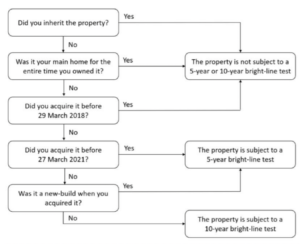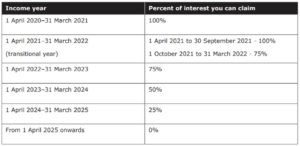
On Tuesday 23 March 2021, the Government announced it would be implementing a range of integrated measures to accelerate the building of new houses, including freeing up build-ready land and investing in infrastructure.
The Government introduced the Housing Acceleration fund which aims to increase the supply of houses and improve affordability for home buyers and renters. For first home buyers, income and house price caps have been increased in targeted areas for first home loans and grants.
Of particular interest to landlords are the extension of the bright-line test and the change to the rules that currently allow property owners to claim interest on loans as an expense. We investigate these changes in more detail.
Extension of the bright-line test to 10 years
The bright-line test applies to anyone who sells a residential property that is not their main/family home within a set period after acquiring it. If you sell within a defined time period, you will be required to pay income tax on any profit made due to the property increasing in value.
The current bright-line period is 5 years. The Government has announced it intends to extend the bright-line period to 10 years for residential property, with the exception of newly built houses (new builds). Inherited properties and those which have been the owner’s main home for the entire time they owned it will continue to be exempt from all bright-line tests.
The following flowchart can be used to determine what period of time a bright-line test applies to a property:

This change is effective from Saturday 27 March 2021 except for new builds acquired before this date (for tax purposes, a property is generally ‘acquired’ on the date a binding sale and purchase agreement is entered into, even if the agreement is still conditional).
What the proposed changes mean if you acquire a residential property on or after 27 March 2021:
If you sell the property more than 10 years after acquiring it (or 5 years for a new build), you will not pay tax under the bright-line test on any gain in value. If you sell the property within 10 years of acquiring it (or 5 years for a new build), and it was your main home for the entire time you owned it, you will not pay tax under the bright-line test on any gain in value.
However, if the property was your main home, but was also a residential investment property for a period of time, the Government intends to introduce a ‘change of use’ rule. This will affect the way tax is calculated if the property was not used as the owner’s main home for more than 12 months at a time within the applicable bright-line period. A property subject to the change-of-use rule will only be required to pay income tax on a portion of the profit made through the property increasing in value, proportionate to the time the property was not the owner’s main home.
If you sell the property within 10 years of acquiring it (or 5 years for a new build), and it was never your main home, you will pay tax under the bright-line test on any gain in value. Source IRD
Interest deductions on residential property
The Government is changing the rules that allow property owners to claim interest on loans used for residential properties as an expense against their income from those properties. The legislation will apply from 1 October 2021.
Currently when owners of residential investment property calculate their taxable income, they can deduct the interest on loans that relate to the income from those properties (claimed
as an expense). This reduces the tax they need to pay. The Government has proposed to change these rules.
The Government will consult on the detail of these proposals and legislation will be introduced shortly thereafter. Consultation will cover the details of an exemption for new builds acquired as a residential investment property, and whether all people who are taxed on the sale of a property (for example under the bright-line tests) should be able to deduct their interest expense at the time of the sale. The legislation will apply from 1 October 2021.
Interest deductions on residential investment property acquired on or after 27 March 2021 will not be allowed from 1 October 2021. Interest on loans for properties acquired before 27 March 2021 can still be claimed as an expense. However, the amount you can claim will be reduced over the next four income years until it is completely phased out, as shown in the table below.

This means that in the 2025–26 and later income years, property investors will not be able to claim any interest expense as deductions against their income. If money is borrowed on or after 27 March 2021 to maintain or improve property acquired before 27 March 2021, it will be treated the same as a loan for a property acquired on or after 27 March 2021. Interest on the loan cannot be claimed as an expense from 1 October 2021.
Property developers (who pay tax on the sale of property) will not be affected by this change. They will still be able to claim interest as an expense.
